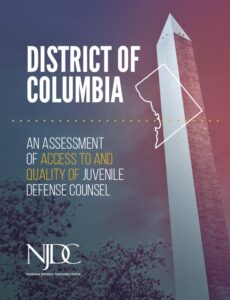District of Columbia: An Assessment of Access to and Quality of Juvenile Defense Counsel (2018)
The National Juvenile Defender Center (NJDC), in partnership with our regional juvenile defender centers and other key stakeholders, has embarked on a nationwide strategy to assess access to and quality of juvenile defense afforded to youth in conflict with the law. Because juvenile justice systems are a state and local responsibility, rather than a federal one, this requires a state-by-state assessment of access to and quality of juvenile defense counsel. To date, NJDC has conducted such assessments in 23 states, including the District of Columbia.
Several consistent themes emerge across these state assessments, including: an array of systemic barriers that prohibit youth from receiving timely access to qualified juvenile defense counsel, juvenile defense not being recognized or acknowledged as a specialized legal practice, and juvenile defense being significantly under-resourced. While all juvenile justice professionals want to ensure the best outcomes for young people and for society, the U.S. Supreme Court clearly noted in In re Gault that “[t]he absence of substantive standards has not necessarily meant that children receive careful, compassionate, individualized treatment,” and that “[t]he absence of procedural rules based upon constitutional principle has not always produced fair, efficient, and effective procedures.” Since the Gault decision, juvenile indigent defense systems have faltered and failed in many jurisdictions, leaving far too many children defenseless in courts of law across the country.

